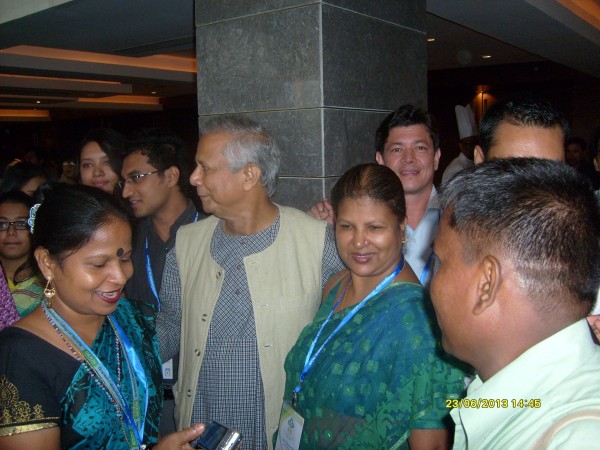When Muhammad Yunus won a Nobel Prize in 2006, in conjunction with the now renown micro-credit organisation Grameen, it was a great day of jubilation in Bangladesh. Since that day, the organisation has continually got better and its methods were exported and implemented world-wide.
Yunus, then a Fullbright scholar and professor, founded the bank in 1976 in an effort to provide small loans, micro-credit, to the poor sector which group otherwise had no access to financing. This despite an interest rate of 20% on loans… which some critics say is excessive.
Grameen has since expanded into a wide range of other successful businesses in fabrics, telephony and energy.
In 2011, 70-year-old Yunus was forced to resign as founding managing director, on the call of Prime Minister Sheikh Hasina Wajed and her government, citing his age.
Sheikh Hasina is said to consider him a potential political threat despite his public abandonment of politics for good, as millions of Grameen families adore him. He did launch himself at the head of a new political party, which act created quite a stir among the people but just as suddenly, he baulked – without explanation in any validating detail.
This launch started in early 2006 when Yunus, along with other renown members of the civil society, participated in a campaign for honest and clean candidates in national elections – in Bangladesh that would be a welcome change, the general populace quite fed up with the abuse of power by the two combative political parties.
Yunus considered entering politics in the latter part of that year. In February 2007, Yunus wrote an open letter, published in the Bangladeshi newspaper Daily Star, asking citizens for views on his plan for a political party with a difference – certainly a novelty – that would intend to establish political goodwill, proper leadership and good governance.
In that letter a call was made asking people to outline how he should go about the task and how they could contribute! Yunus finally announced that he was willing to launch a political party called Citizens’ Power (Bangla: Nagorik Shakti) on 18 February 2007.The army it was said supported this move by Yunus into politics. Suddenly, on 3 May, Yunus declared that he had changed his mind – following a meeting with the head of the interim government, Fakhruddin Ahmed.
It is on record that the Central Bank of Bangladesh has never questioned the quality of the bank’s management, rather it has praised it each year, a spokesperson was reported saying: “The borrowers have been pleased about the way the bank is run. Why has the inquiry commission all of a sudden come up with a bizarre proposal for replacing the bank’s legal structure? Will the inquiry commission explain to the people of Bangladesh why a bank that operates with its citizens’ own money surrender 51 percent or more of its shares to the government, knowing fully well that will be extremely risky, to say the least!”
It can only be assumed the government officials need the money and the poor will have to cough it up!










